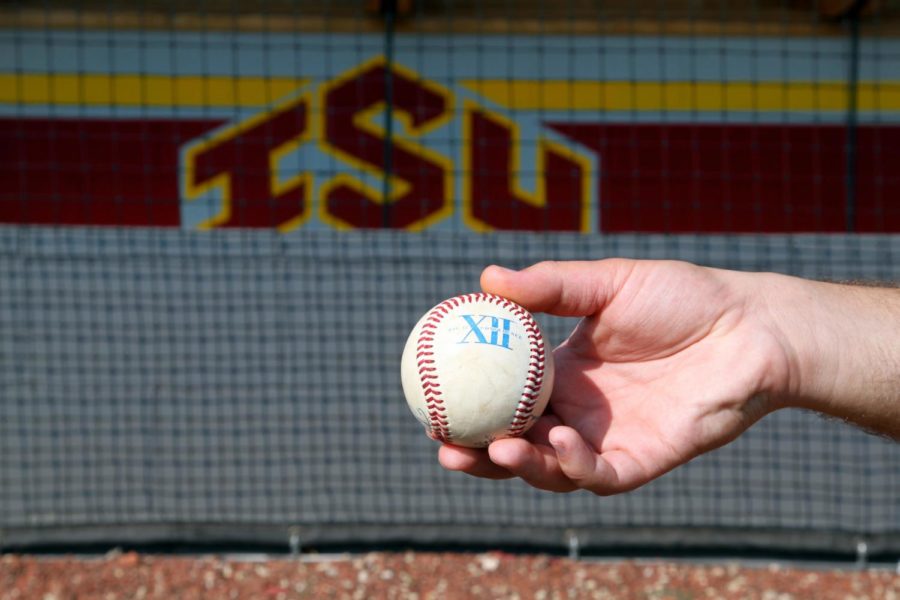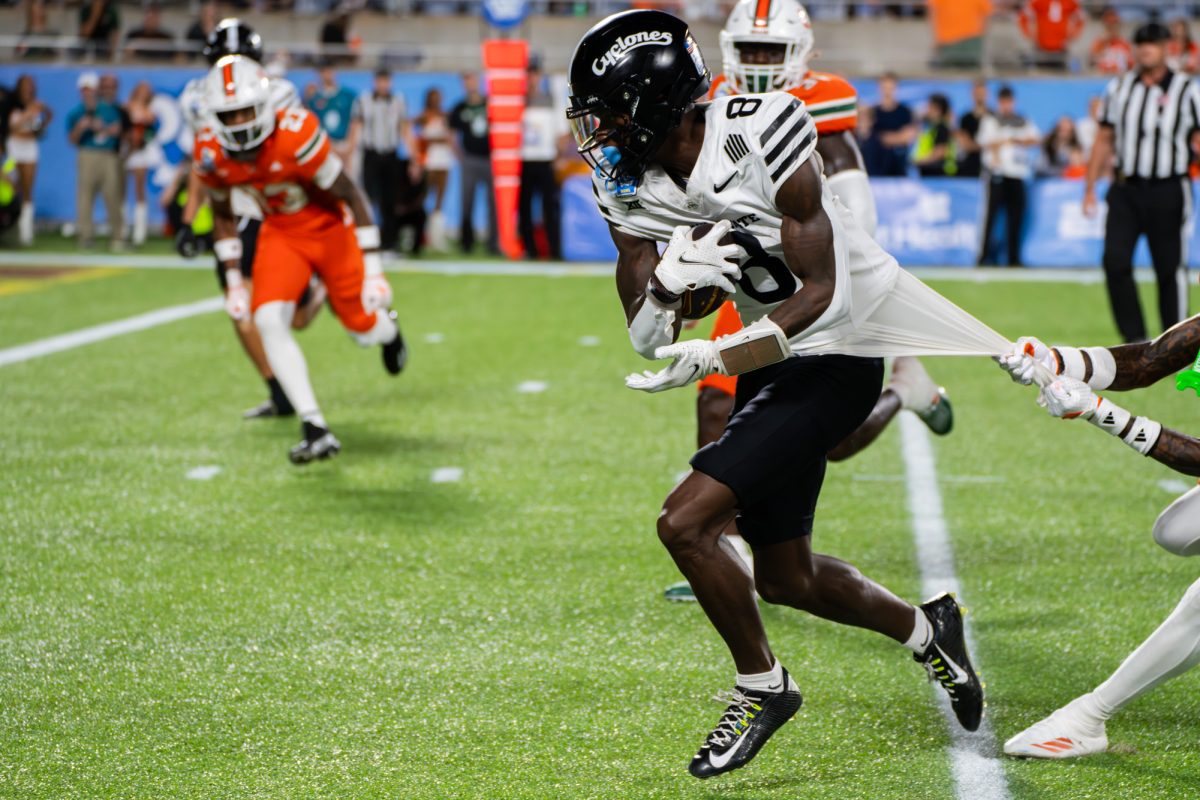A flashback to 2001: The final Iowa State baseball season
September 24, 2017
Head coach Lyle Smith was relaxing at home after the Iowa State baseball team just claimed a crucial series win over the Oklahoma State.
Smith was watching the Sunday night news, until his phone started going off.
Ring. Ring. Ring.
He got off his chair and walked over to his landline to pick it up. The news he received from that call would, at first, be confusing but at the same time, change Smith’s life on a dime.
“I got a call from a columnist from the Ames Tribune,” Smith said. “He started with the line of questioning of ‘How do you feel about (Iowa State) dropping the (baseball) program?’”
Smith really had nothing to say to the Ames Tribune columnist. He was scratching his head wondering why the writer was asking about Iowa State dropping the baseball program. That is, until he received another call a few minutes after he finished up with the reporter.
“I received a call from the athletic director that he wanted a meeting with me the next morning to talk about the budget,” Smith said. “He didn’t say anything at that moment. But you can put two and two together and this is not going to be good. So really, I learned of the situation from a sports columnist.”
On April 2, 2001, then-Iowa State athletic director Bruce Van De Velde announced that the university would no longer have a baseball program after the 2001 season. The announcement from Van De Velde came a day before the Cyclones were set to take on in-state rival Iowa at home at the midway point of the season.
The Iowa State baseball program began in 1892, and it produced major league players like Los Angeles Dodger infielder Mike Busch and Pittsburgh Pirates pitcher Don Wengert.
In 109 years, the program held a record of 1,346 wins, 1,412 loses and 17 ties. No other program at the time who made the Big 12 tournament that year had played more seasons.
The decision to cut baseball was a shock to everyone on the team. During that season, players heard rumblings that Iowa State may cut men’s swimming and diving – which it did – but they never thought the university would get rid of America’s pastime.
“It was a blow,” said then-senior infielder Rob Conway. “We were blindsided.”
Don Green, who played in 1988 and 1989, remembers reading an article in the Des Moines Register about the program getting cut. He dropped the paper and picked it up to read it again. He couldn’t believe what he was reading.
Afterwards, there were countless emails sent back and forth between teammates. The next focus was on how to get the baseball program back for the future.
“We all supported the 2001 baseball team and we’re shocked by the news,” Green said. “It’s not just a hurdle, it’s a mountain [to get the program back].”
Unfortunately, due to a $1.4 million budget shortfall, being the northernmost school in predominantly southern baseball conference, Title IX and a lack of competitiveness in the Big 12, there was really no choice but to cut the program.
Looking back on the program, there are certainly mixed feelings on what could have been done to prevent it from ending.
Brad Kaufman, a pitcher for Iowa State from 1991-93, had heard about the cut from different family members and previous players. The thing that shocked him the most was there were no opportunities to raise the money and continue the program.
Kaufman recalls the baseball program being put on the chopping block, but the players took time to ask for donations and hold fundraisers to keep the program. About five years later, the same situation happened and they raised enough money again. In 2001, there was no chance to raise money.
It was gone.
“[Coach] Bob Randall saved this program twice,” Kaufman said. “If any player said they weren’t sad or shocked from the decision to cut the baseball program, they’d be lying. It was a sad day for everyone.”
Conway had a few thoughts throughout his time at Iowa State that left him scratching his head.
“This kind of bugged some of the guys on the team,” Conway said. “[The athletics department] flew the band out to the bowl game which we were told cost as much as our one year budget. So that kind of rubbed some guys on the team raw. But that was the first time (the football team) had been to bowl in a long time. But it was the Insight.com Bowl. It was not a major bowl.”
Knowing that the program was to be cut, players used that as motivation to make it the best season possible. That showed as the year went on.
Iowa State then claimed a series win over then-No. 1 Nebraska. Thanks to that series win, the Cyclones qualified for the Big 12 Tournament. And their first tournament game on Thursday, May 12, 2001, is the perfect example of them persevering to continue playing the game they loved.
It was the bottom of the ninth, Iowa State had runners on second and third base, and Baylor was up 5-4. Conway was up to bat.
Thousands of fans were on their feet screaming and stomping for Iowa State to win this game. If the Cyclones won, that meant the program continued for one more day.
Conway hit a sharp ball to Baylor’s second baseman and the ball skipped off his glove and into right field. Pinch runner Beau Hampton was waved home. His head first slide would beat the throw, and the Cyclones won 6-5.
Fans erupted in elation that Iowa State was able to prolong its season.
That was the last time the baseball program would hear the sound of winning cheers.
“They thumped us pretty good,” Smith said. “Teams like Oklahoma State want to get you back. They want to beat you the next time around. It wasn’t as competitive as you would’ve liked for the last game to be.”
The Cyclones took on the Cowboys in the second round of the Big 12 Tournament. The end result was Oklahoma State manhandling Iowa State, 17-4.
Kaufman remembered the last game not because of the loss, but because of the character surrounding this baseball team. The majority of former Iowa State players came back with their families to witness the last game.
After the game, there were many tears shed, but a lot of smiles on faces. Tears were shed due to the significance of the game, but smiles were formed because of the actions after the game.
“All of the players, after the game, came onto the field and stayed on the field for quite a bit of time,” Kaufman said. “I remember playing catch with my oldest son and that memory will always be ingrained in my head.”
The main thing that Kaufman hates about the program being cut today is that the future generations can’t continue to follow the same footsteps.
“I have a 17-year old son that’s a pitcher and enjoys the game of baseball,” Kaufman said. “You always think that it would be amazing to have your son follow your footsteps and play baseball collegiately. Now, he won’t be able to play at Iowa State and will have to play at a different school.”
After walking off the field, there was a sense of ‘wow, it is really over’ in the minds of the players and coaches. But that was not the worst part. It felt like a funeral to most of them.
“It was really somber. It felt like a funeral,” Conway said. “Afterward, it was pretty bad. Most guys, especially their senior year, probably get emotional when they play their last college game because they are not going to play afterwards. But it was bigger than that. From freshman to seniors, it was the end of it. That was it.”
“That is probably the last time I had a really good cry outside of losing my dog a couple years ago. I have four kids and I’m married, but there was no shame in the emotional release that almost everyone had. We just hung out in the dugout for quite a long time to let our emotions out.”
On Monday, April 2, 2001, Smith met with Van De Velde at 8:30 a.m. sharp.
The entire meeting was Smith listening to Van De Velde explain why there would be no more Division I Iowa State Cyclones baseball.
After the meeting with Van De Velde, Smith had to wait a couple hours before he saw his team at 1:30 p.m. for their regulatory meeting.
He waited outside of the meeting room. He waited for every player and other coaches to be seated. He pondered on how he would deliver the news. After giving himself 5-10 minutes to gather his thoughts, he took a deep breath, opened the door and walked in.
Smith presented the information and the room went silent.







